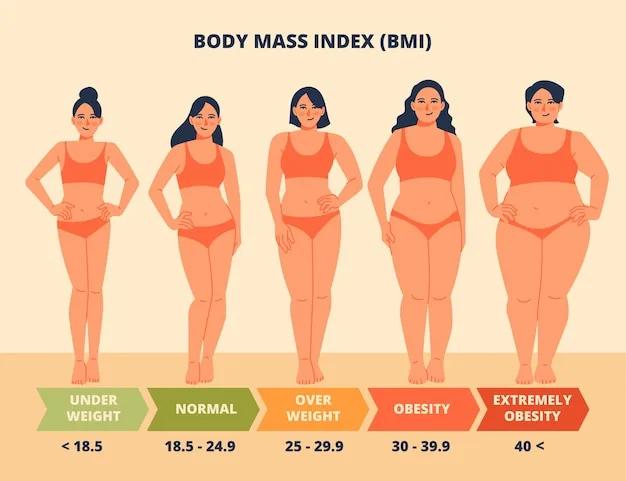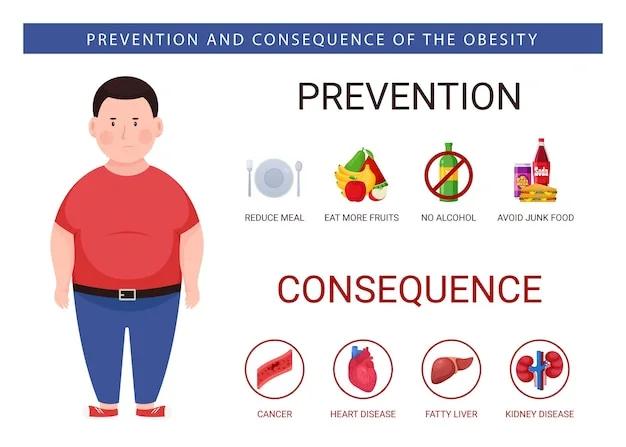
If you are struggling with obesity or overweight issues, you may already be aware of the challenges it poses to your overall health. However, it is important to understand the specific health risks associated with having a high body mass index (BMI).
One method of classifying obesity, used by healthcare professionals is a screening tool called Body Mass Index. BMI is a measure of your body fat based on your height and weight. Here are some of the health risks associated with having a high BMI:
1. Cardiovascular disease: People with a high BMI are at a higher risk of developing heart disease, which can lead to heart attacks, strokes, and other cardiovascular problems
2. Type 2 diabetes: Obesity is a major risk factor for developing type 2 diabetes, a chronic condition that affects how your body processes blood sugar
3. High blood pressure (Hypertension): Being overweight or obese can cause your blood pressure to rise, which can increase your risk of heart disease and stroke
4. Sleep apnea: People with a high BMI are more likely to have sleep apnea, a condition where breathing stops and starts repeatedly during sleep, which can lead to daytime fatigue and other complications
5. Joint problems: Excess weight puts added pressure on your joints, which can lead to arthritis, joint pain, and other problems
6. Cancer: Obesity has been linked to an increased risk of several types of cancer, including breast, colon, and pancreatic cancer
7. Mental health In today’s society: High BMI is becoming increasingly common due to a sedentary lifestyle and unhealthy eating habits. However, many people don’t fully understand the health risks associated with having a high BMI. This blog post aims to provide comprehensive information on what BMI is and the potential health problems that may arise from having a high BMI.
What is BMI?
BMI, or Body Mass Index, is a simple measurement that shows if a person has a healthy weight about their height. A high BMI indicates excess body fat and can lead to several health risks such as heart disease, stroke, type 2 diabetes and some cancers. The formula for calculating your BMI is your weight in kilograms divided by your height in meters squared(kg/m²). Don’t worry if math isn’t your strongest subject there is an NHS BMI calculator that can do the work for you and provide you with your BMI score in just seconds. Maintaining a healthy BMI through proper diet and exercise can reduce the risk of health problems like heart disease, stroke, and type 2 diabetes.
Being overweight or obese increases the risk of developing health problems such as high blood pressure, coronary heart disease, fatty liver disease and gallbladder disease. It also puts extra pressure on joints leading to osteoarthritis. Maintaining a healthy BMI through regular exercise and a balanced diet can reduce the risk of these health problems. It is also important to note that weight gain can also affect quality of life.
NHS guidelines on BMI values
A BMI calculation in the healthy weight range is between 18.5 to 24.9.
For Black, Asian and some other minority ethnic groups, the healthy weight range is 18.5 to 23.
For people of White heritage, a BMI:
- below 18.5 is underweight
- between 18.5 and 24.9 is healthy
- between 25 and 29.9 is overweight
- of 30 or over is obese
Black, Asian and some other minority ethnic groups have a higher risk of developing some long-term conditions such as type 2 diabetes with a lower BMI. People from these groups with a BMI of:
- 23 or more are at increased risk (overweight)
- 27.5 or more are at high risk (obese)
BMI Categories
Understanding the BMI scale is crucial in assessing one’s health risks. BMI, or body mass index, measures a person’s weight about their height and provides an estimate of their body fat percentage. While it doesn’t directly measure body fat percentage, it is still a useful tool for identifying potential health risks associated with obesity.
While there are other ways to measure body composition such as skinfold thickness measurements and bioelectrical impedance analysis (BIA), BMI remains widely used due to its convenience and low cost. It is important to note that while BMI can help identify health risks associated with high levels of adiposity, it does not account for factors such as muscle mass or bone density.
Health Risks of High BMI
A high BMI is associated with an increased risk of chronic diseases such as cardiovascular disease, type 2 diabetes, and some cancers. While it’s commonly known that being overweight can lead to health problems, even people with a normal weight may still be at risk if they have a high body fat percentage – this phenomenon is often referred to as “skinny fat.” Excess weight can put stress on the body’s organs and cause issues like high blood pressure and unhealthy cholesterol levels.
Carrying excess weight also increases your likelihood of developing fatty liver disease, gallbladder disease, sleep apnea, osteoarthritis, and stroke. Additionally, having a BMI above the healthy range has been shown to impact mental health by increasing feelings of anxiety and depression. It’s important to prioritize maintaining a healthy weight through regular exercise and balanced nutrition to reduce the risk of these potential health complications down the line.
Cardiovascular Diseases
High blood pressure, cholesterol, and triglycerides are all linked to cardiovascular disease. When these levels are elevated in the body over a long period, they can lead to plaque buildup in the arteries which restricts blood flow and increases the risk of heart attack or stroke. In addition, obesity can have a significant impact on heart function as excess weight puts stress on the heart and contributes to conditions such as coronary artery disease (CAD), one of the most common complications associated with cardiovascular disease.
Maintaining a healthy BMI is crucial for reducing health risks associated with high body fat percentages. Furthermore, adopting healthy habits such as regular exercise and avoiding foods high in saturated fats can help lower LDL cholesterol levels while increasing HDL cholesterol levels. Taking steps towards maintaining an optimal range for both BMI and cholesterol levels may significantly reduce your risk of developing cardiovascular diseases like coronary heart disease later in life.
Type 2 Diabetes
Obesity is a known risk factor for type 2 diabetes due to the link between excess body fat and insulin resistance. When overweight individuals gain weight, their bodies require more insulin to regulate blood sugar levels, leading to decreased sensitivity and eventual resistance. This can result in high blood sugar levels which over time can lead to type 2 diabetes.
Managing diabetes in obese patients typically requires a multifaceted approach that combines diet, exercise, medication, and surgery when necessary. Weight loss can improve insulin sensitivity and reduce the need for medication or even eliminate it in some cases. However, maintaining long-term weight loss is challenging without lifestyle changes such as regular physical activity and healthy eating habits. In severe cases of obesity-related health risks like cardiovascular disease or fatty liver disease where other treatments have failed, surgery may be an option, but should only be considered after careful evaluation of all options by medical professionals specializing in this area of treatment.
Joint problems
Carrying excess weight puts extra pressure on the joints, and as a result, joint problems are more likely to occur in people with a high BMI. Osteoarthritis is a common issue for those carrying extra pounds, especially in their knees. Losing even just 5-10% of body weight can significantly reduce the chances of developing joint problems.
Joint pain caused by being overweight or obese can also make exercise difficult, which further contributes to health risks such as heart disease and stroke. It’s important to take steps towards losing weight if you have a high BMI to reduce your risk of joint problems and other associated health issues.
Sleep Apnea
Obstructive sleep apnea (OSA) is a serious medical condition that affects breathing during sleep. It occurs when there are repeated episodes of complete or partial blockage in the upper airway, leading to interrupted breathing patterns. This can result in symptoms such as loud snoring and daytime fatigue.
Some common symptoms of OSA include:
- Loud snoring
- Daytime fatigue
- Choking or gasping while sleeping
- Morning headaches
- Difficulty concentrating
Continuous Positive Airway Pressure (CPAP) machines are one effective treatment for OSA. These devices work by delivering pressurized air through a mask worn over the nose or face, which keeps the airway open and prevents interruptions in breathing during sleep.
If left untreated, OSA can lead to serious health risks such as:
- Cardiovascular disease
- High blood pressure
- Stroke
- Type 2 diabetes
Individuals with high BMI need to be aware of their greater risk for OSA and other associated health conditions. By maintaining a healthy weight through diet and exercise, these risks can be significantly reduced.
Gastrointestinal problems
GERD, or Gastroesophageal reflux disease, is a digestive disorder where stomach acid flows back into the oesophagus causing irritation and discomfort. GERD symptoms include heartburn, regurgitation of food or liquid, and difficulty swallowing. Nausea and vomiting can also occur in some cases. It’s important to note that being overweight or obese increases your risk of developing GERD. Weight loss through diet changes and exercise can be an effective treatment strategy.
When it comes to treating obesity-related gastrointestinal problems like GERD, bariatric surgery may be considered an option. Gastric bypass surgery involves creating a small pouch from the stomach which limits food intake while laparoscopic adjustable gastric banding uses a silicone band around the upper part of the stomach to create a smaller pouch which restricts food intake as well. The type of bariatric procedure depends on factors such as body mass index (BMI) and overall health status. However, before considering any surgical solution it’s always best to consult with your doctor first regarding both benefits and risks associated with each procedure.
Cancer
Excess weight can increase the risk of developing certain types of cancer. Obesity is linked to various health risks, including some cancers such as breast, colon, endometrial, kidney and pancreatic. This is because being overweight or obese can cause changes in hormones that may lead to the development of these cancers.
Studies have shown that having a high BMI increases the risk of cancer by up to 40%, making it one of the most significant health risks associated with obesity. It’s essential to maintain a healthy weight through regular physical activity and a balanced diet to lower your chances of developing these types of cancer and other chronic diseases like cardiovascular disease, type 2 diabetes, stroke and more.
Reducing BMI
The most effective ways to lose weight quickly and safely include a combination of healthy eating habits and regular exercise. Crash diets, while they may result in rapid weight loss, are not recommended for long-term weight management due to their potential negative health effects. Instead, it is important to create a sustainable diet and exercise plan that promotes healthy weight management.
To reduce BMI safely and effectively, consider incorporating the following strategies:
- Eating a balanced healthy diet with plenty of fruits, vegetables, lean protein sources, whole grains and healthy fats
- Engaging in regular physical activity such as cardio workouts or strength training exercises
- Practising mindfulness techniques like meditation or yoga to manage stress levels
- Getting enough sleep each night
- Avoiding processed foods high in sugar or saturated fat
By adopting these lifestyle changes gradually over time rather than pursuing quick fixes like fad diets or drastic calorie restrictions can lead to lasting reductions in BMI without compromising overall health.
Conclusion
Maintaining a healthy BMI is crucial for reducing health risks associated with being overweight. A high BMI increases the chances of developing heart disease, type 2 diabetes, and certain cancers, among other health conditions. However, even small changes such as incorporating more physical activity into your daily routine or making healthier food choices can lead to significant results over time. By taking these steps towards a healthier lifestyle, you can reduce your risk of various health problems and improve your overall well-being.
Sources
Medical Disclaimer
NowPatient has taken all reasonable steps to ensure that all material is factually accurate, complete, and current. However, the knowledge and experience of a qualified healthcare professional should always be sought after instead of using the information on this page. Before taking any drug, you should always speak to your doctor or another qualified healthcare provider.
The information provided here about medications is subject to change and is not meant to include all uses, precautions, warnings, directions, drug interactions, allergic reactions, or negative effects. The absence of warnings or other information for a particular medication does not imply that the medication or medication combination is appropriate for all patients or for all possible purposes.









